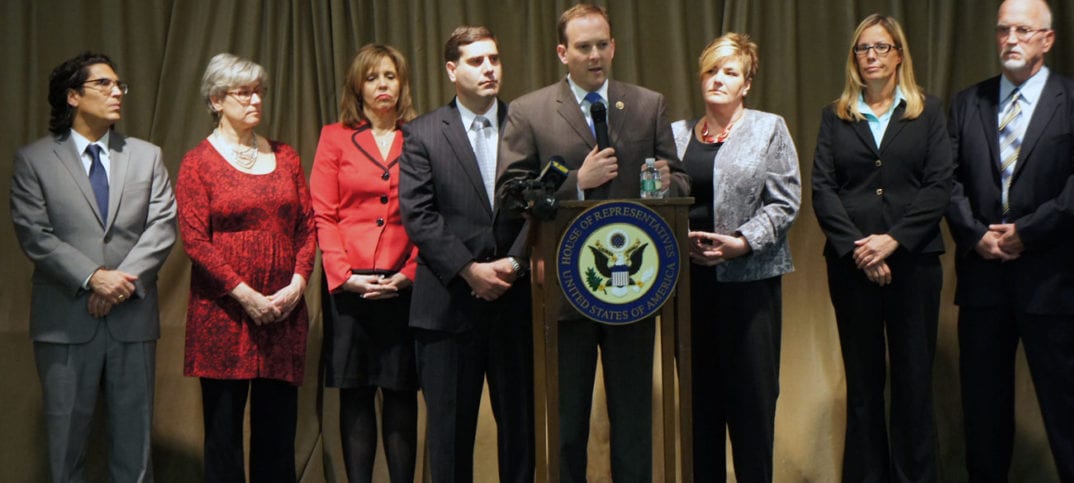By Phil Corso
Congress is taking unprecedented steps to fight heroin and opioid abuse, and U.S. Rep. Lee Zeldin (R-Shirley) brought the battle to Kings Park to spread the word.
In the company of other lawmakers and activists, Zeldin spoke at VFW Post 5796 last Thursday to discuss a package of bipartisan legislation the congressman has been pushing that addresses different angles of the disturbing upward trend in heroin and prescription opioid abuse on Long Island and across the country. The momentum from his stumping also helped propel several pieces of such legislation to a vote on the House floor by the following week.
The proposed legislation would review and update guidelines for prescribing opioids and pain medication, and require a report to Congress on the availability of substance abuse treatment in the country, among other provisions.
In his remarks last week, the congressman cited an alarming statistic from the Centers for Disease Control: more than 28,000 overdose deaths were recorded in 2014 as a result of heroin or opioid abuse — the highest number on record. Zeldin, who joined the Bipartisan Task Force to Combat the Heroin Epidemic in November, said Suffolk County recorded one of the highest rates of overdose deaths across the state, and needed a multi-pronged approach to address it.
“Next week, the House of Representatives is dedicating a full week to passing legislation aimed at addressing this epidemic, with a package of several bills to combat the growing heroin and opioid crisis,” Zeldin said. “Addiction and overdose deaths on Long Island and across our country are skyrocketing as a direct result of the increase in heroin and opioid abuse.”
In a phone interview, Zeldin said this was the first time the House had taken such unified measures to combat the problem, as its consequences were becoming impossible to ignore. The congressman used strong language when outlining the heroin addiction problem to drive it home.
“The rates that overdoses are increasing, and the fact that it’s not isolated to any one kind of community, has led many to describe this as an epidemic,” he said.
Joining Zeldin was Suffolk County Police Commissioner Tim Sini, who has been working on the front lines of the addiction problem, as Suffolk County suffered 103 fatal heroin overdoses in 2015 alone — more than double its neighboring Nassau County, which recorded 50. Sini also used the term “epidemic” to describe the fight he and his fellow officers have been facing.
“The heroin epidemic that our nation is facing is the number one public health and public safety issue here in Suffolk County,” Sini said. “Partnerships between local law enforcement and our federal representatives is a crucial tool in the battle against this scourge.”
And North Shore natives who felt the hurt of that “epidemic” stood beside Zeldin and Sini to throw their support behind legislative resolutions. Kim Revere, president of the Kings Park in the kNOw Community Coalition, and Linda Ventura, founder of the Thomas’ Hope Foundation, both said there were several different approaches lawmakers must take to address addiction, from prevention to rehabilitation.
“I believe wholeheartedly that prevention should begin at home,” said Revere, referring to the legislation as a wakeup call. “I am seeing many adults abusing alcohol and [prescription] drugs and that does not bode well for our children. I would like to see permanent evidence-based prevention programs implemented in school grades kindergarten through 12.”
Ventura, whose son Thomas died at age 21 from a drug overdose four years ago, said measures like Narcan, a medication which is administered to help reverse the effects of a heroin overdose, were important but not the only tool emergency responders should lean on.
“The United States needs to commit every resource imaginable to fight this insidious disease. The lifesaving tool Narcan needs to be accessible to all concerned to help save a life in the interim of an overdose to find treatment,” she said. “Treatment needs to be the appropriate level of care at the earliest intervention possible. Prevention — we must start educating and empowering our youngest of children with coping skills, relaxation techniques and communication skills.”







